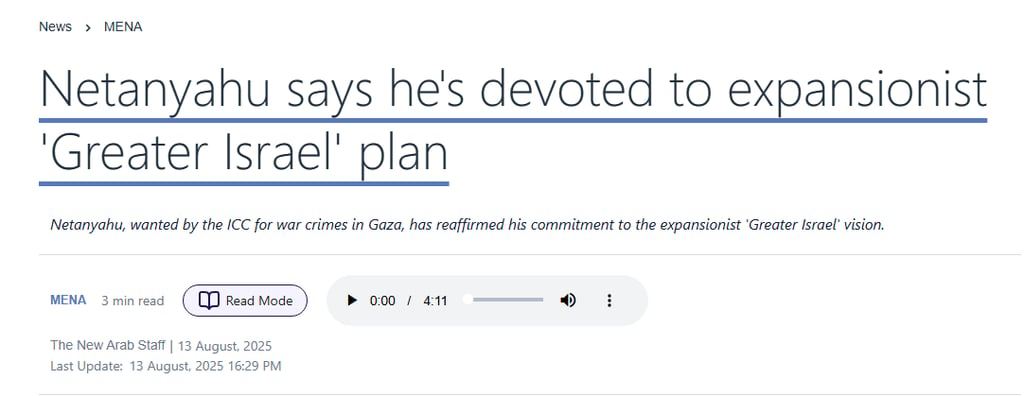Netanyahu Seeks and Proclaims Establishment of "Greater Israel"
I hate to tell you I told you so, but I told you so.
DailyBeastie.Com
8/15/202517 min read
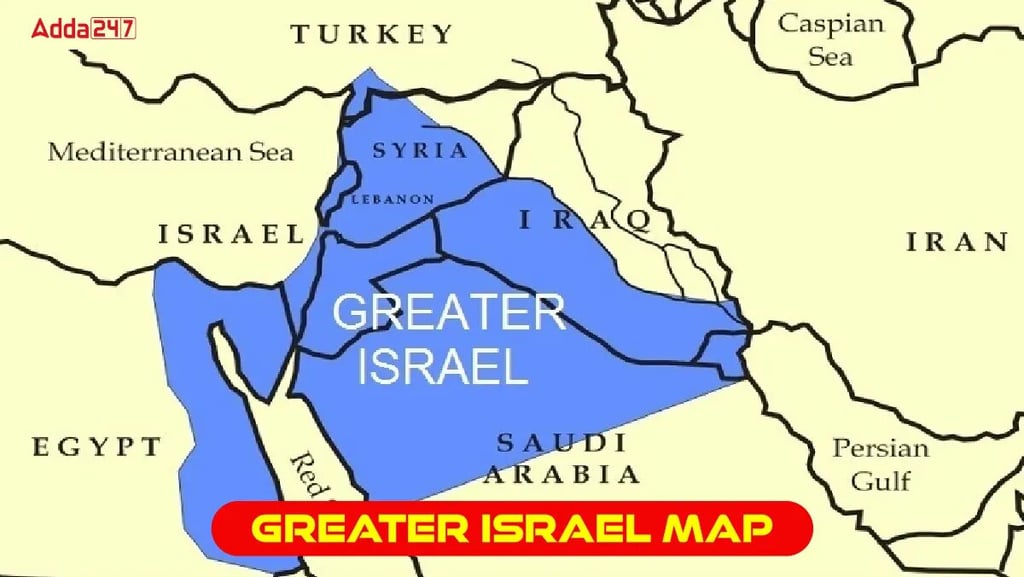

The right of the Jewish people to the land of Israel is eternal and indisputable… therefore, Judea and Samaria will not be handed to any foreign administration; between the Sea and the Jordan there will only be Israeli sovereignty. —Likud Party Platform, 1977

Benjamin Netanyahu views himself as the "Zionist Messiah" born to establish "Greater Israel" from the river to the sea.
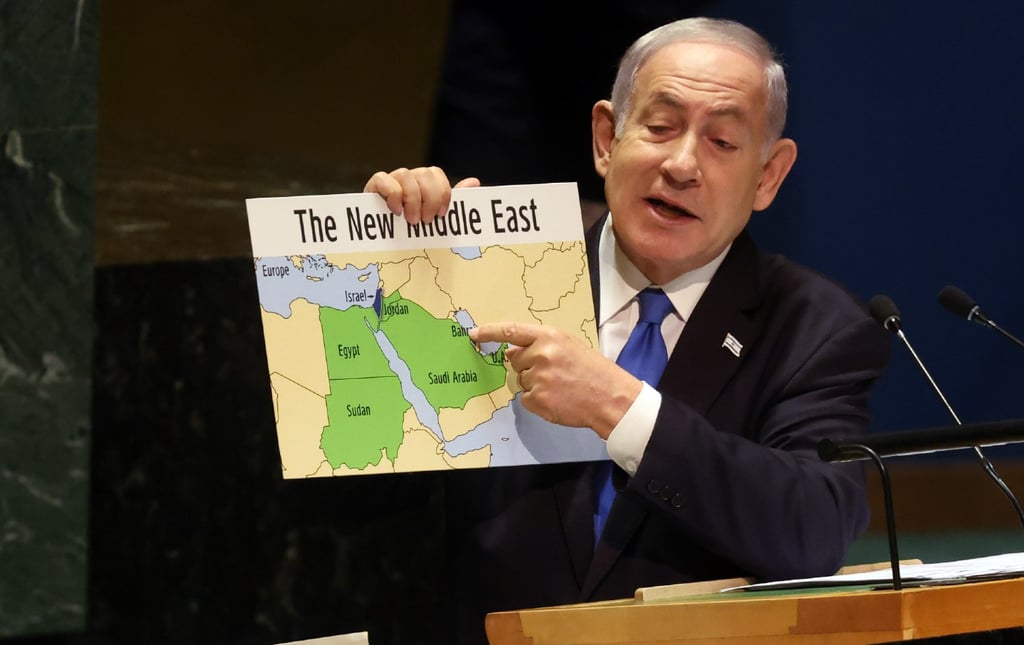

During a speech before the United Nations General Assembly on September 22, 2023, Prime Minister Benjamin Netanyahu holds up a map that shows Israel stretching “from the river to the sea.”
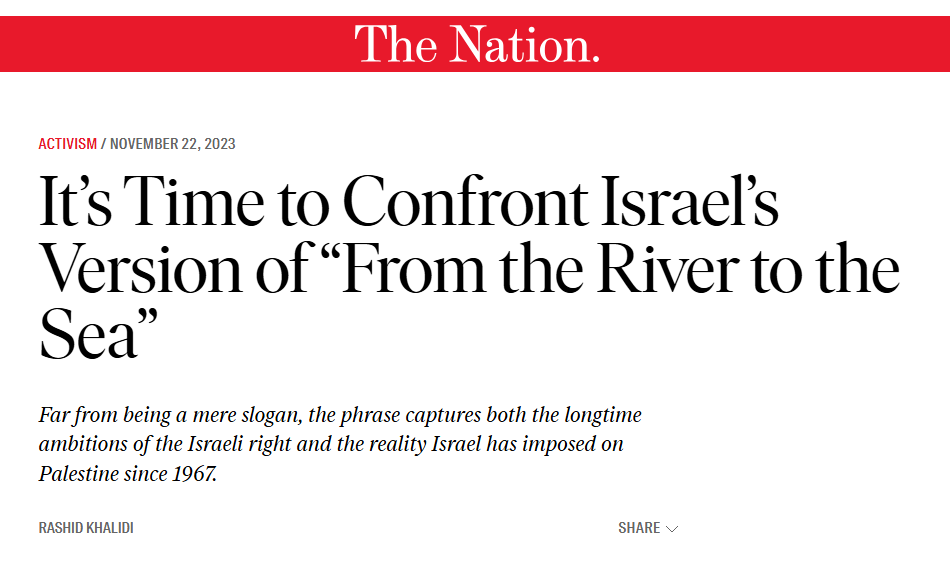

Activism / November 22, 2023
It’s Time to Confront Israel’s Version of “From the River to the Sea”
Far from being a mere slogan, the phrase captures both the longtime ambitions of the Israeli right and the reality Israel has imposed on Palestine since 1967.
The slogan “from the river to the sea” apparently has great power, so great that it led the US House of Representatives to censure one of its members who invoked it, and Columbia University to shut down two student organizations whose members repeated it, Jewish Voice for Peace and Students for Justice in Palestine. Other universities have since followed suit.Read More
While these august bodies engaged in deliberations about the grave breaches that mouthing these words entailed, over 100 children per day were dying in Gaza under a rain of tens of thousands of Israeli bombs, rockets, missiles, and artillery shells, many manufactured by American companies in which Columbia University has invested and paid for by US taxpayers.
Meanwhile, Israeli ministers were talking about inflicting “Nakba 2023” on Gaza (an echo of Israel’s 1948 ethnic cleansing of 750,000 Palestinians); over 1.7 million Gazans had been forced from their homes; over 14,000 had been killed (nearly 6000 of them children) and 30,000 wounded; most hospitals had been put out of service; and half the structures in the Gaza Strip had been destroyed or damaged.
Beyond these numbers—and for many, they were just numbers, for how can you illustrate the names, faces, and personal stories of thousands of dead men, women, and children, especially when their tormentors have turned off the electricity and, at times, Internet and phone communications, and prevented Western journalists from being present to witness their ordeal?—lay some brutal facts.
From the first day of this war, Defense Minister Yoav Gallant, who said Israel was fighting “human animals,” ordered the cutting off not only of electricity but also supplies of water, medicine, food and fuel, in breach of Article 23 of the Fourth Geneva Convention of 1949, which requires “the free passage of all consignments of medical and hospital stores and…all consignments of essential foodstuffs.”
While President Biden has called for the delivery of humanitarian assistance to Gaza, the United States has so far done little to make it happen, beyond persuading Israel to allow entry of a tiny trickle of relief supplies (excluding fuel), as if the US has no power to do anything more.
Cutting off these commodities, as well as water, electricity, and fuel, constitutes a war crime, no less than does the killing of noncombatants, whether Israeli or Palestinian, or the mass expulsion of 1.7 million people from one part of the Gaza Strip to another.
But the Biden administration and its Western allies not only refuse to call for a halt to the bombing and ethnic cleansing.
They cannot even bring themselves to demand, on pain of sanctions, that Israel turn on the electricity and water taps, or that Israel allow the delivery of the hundreds of trucks of medicine, food, and fuel a day that are needed to supply the needs of 2.3 million people, most of them children.
The commander in chief is unwilling to order the huge American fleet stationed nearby in the Mediterranean to deliver the requisite supplies to Gaza and evacuate the multitude of wounded, which could easily be done, irrespective of the wishes of the besiegers.
Against the callousness of those in power who refuse to impose a halt to Israel’s rain of fire on the Gaza Strip, stand a few courageous members of Congress, campus demonstrators, and behind them huge numbers of citizens enraged at their country’s participation in the slaughter and collective punishment of the civilian population of Gaza.
Instead of applauding their courage in demanding accountability for mass murder and ethnic cleansing, a shameless Congress and a spineless university administration hold them to account for use of a phrase demanding freedom in the entirety of their homeland for a people which, since 1917, has suffered under foreign rule and has never been allowed self-determination.
Somehow, in the “land of the free” a call for Palestinian freedom becomes an odious and hateful demand.
The crowning irony regarding claims about the hatefulness of such a phrase—one university administrator described it as “genocidal”—is that this idea is far more than a simple slogan where Israel is concerned.
Rather, it captures the reality Israel has imposed on Palestine since 1967.
Israel controls all the land between the Mediterranean and the Jordan River, an area that for all intents and purposes constitutes a single state under a single security regime and a single sovereignty.
The drive to establish the “Greater Land of Israel” is the central ideological goal of the Likud Party, which has dominated Israeli politics since 1977.
The commitment to Greater Israel was enshrined in the “Basic Laws” of the Israeli state in 2018 when the Knesset passed the “Nation State of the Jewish People” law.
This law states that the right to national self-determination in Palestine “is unique to the Jewish People” and that “the State views the development of Jewish settlement as a national value, and shall act to encourage and promote its establishment and strengthening.”
This commitment is one of the “guiding principles” of the current Israeli government, which stated that “the Jewish people have an exclusive and inalienable right to all parts of the Land of Israel,” including “Judea and Samaria.”
Thus, on one side, we have students and a politician representing the demands of tens of millions of citizens who call for freedom for the Palestinians.
On the other, we have the power of the American state supporting the core policies of Israel’s government that over the past few decades has acted ceaselessly to ensure that “between the Sea and the Jordan there will only be Israeli sovereignty.”
Rather than focusing on real war crimes designed to uphold Israel’s exclusive sovereignty over the entirety of historic Palestine from the river to the sea, the priorities of Congress and the paragons of the Ivy League lie elsewhere, as is evidenced by their disgraceful, laser-like focus on completely spurious thought crimes.
Israeli Prime Minister Benjamin Netanyahu has openly declared his commitment to a so-called "Greater Israel" vision, describing himself as on a "historic and spiritual mission" to achieve the expansionist ideology which seeks Israeli control not only over Gaza, the West Bank, and East Jerusalem, but also parts of Egypt, Jordan, Syria, Lebanon, and Iraq.
In an interview with Israel's i24NEWS on Tuesday, Netanyahu said he felt "very much" connected to the vision, which was rooted in Revisionist Zionism.
The expansionist idea has long been criticised for promoting the seizure of land beyond Israel's borders, bringing in Jews from around the world to inhabit it, and expelling indigenous populations.
It was first publicly invoked in 1956 by Israel's founding Prime Minister David Ben-Gurion, who justified Israel's role in the tripartite attack by France, Britain, and Israel on Egypt's Suez Canal area by citing the "biblical borders of the kingdom of David and Solomon".
Breaking from his usual pattern of granting exclusive interviews to the pro-government Channel 14, Netanyahu used the platform to cast himself as a leader on a "mission on behalf of the Jewish people."
He again pushed to "allow civilians to leave Gaza", likening it to refugee flows from Syria, Ukraine, and Afghanistan, without acknowledging Israel’s 18-year blockade of the territory or the mass displacement caused by its current genocidal military campaign, which kills scores of civilians every day.
Jordan's foreign ministry condemned Netanyahu's comments as a dangerous and provocative escalation, warning they threaten the sovereignty of states and violate international law and the UN Charter.
Ministry spokesperson Sufyan Qudah said the remarks reflected the "critical situation" of Israel’s government as it faces growing international isolation over its ongoing aggression in Gaza and the occupied West Bank.
He called on the international community to act immediately to stop all such provocative actions and statements that endanger the region’s stability and international peace and security.
Recent reports indicate Israel has approached countries, including South Sudan, Indonesia, and Libya, to accept Palestinians forcibly expelled from Gaza, raising fears of large-scale ethnic cleansing.
On Wednesday, South Sudan's Foreign Affairs Ministry denied an Associated Press report claiming it was in talks with Israel to resettle Palestinians in the East African country.
For Palestinians, any effort to force them off their land would recall the "Nakba", or catastrophe - the mass displacement of Palestinians during Israel's creation in 1948.
Netanyahu has endorsed Trump's suggestion earlier this year to expel Gaza's more than two million people to Egypt and Jordan, while far-right Israeli ministers have called for their "voluntary" departure.
He said he would oppose any deal that would see the staggered release of Israeli captives held by Hamas, and instead would "want to return all of them as part of an end to the war - but under our conditions".
Mediation efforts led by Qatar, Egypt and the United States have failed to secure a breakthrough since a short-lived truce earlier this year.
Gaza's civil defence agency said Israel had intensified its air strikes on Gaza City in recent days, following the security cabinet's decision to expand the war there.
"The Israeli occupation is intensifying its bombardment [using] bombs, drones, and also highly explosive munitions that cause massive destruction", Civil Defence spokesman Mahmud Bassal said on Tuesday, noting that air raids had been increasing over the past three days.
Israel has faced mounting criticism over the war, with Netanyahu himself the target of an arrest warrant by the International Criminal Court for alleged war crimes and crimes against humanity in Gaza.
In Gaza, Israeli forces have killed more than 61,000 people, mostly women and children, and have used deliberate starvation as a weapon of war.
https://www.newarab.com/news/netanyahu-says-hes-devoted-greater-israel-plan
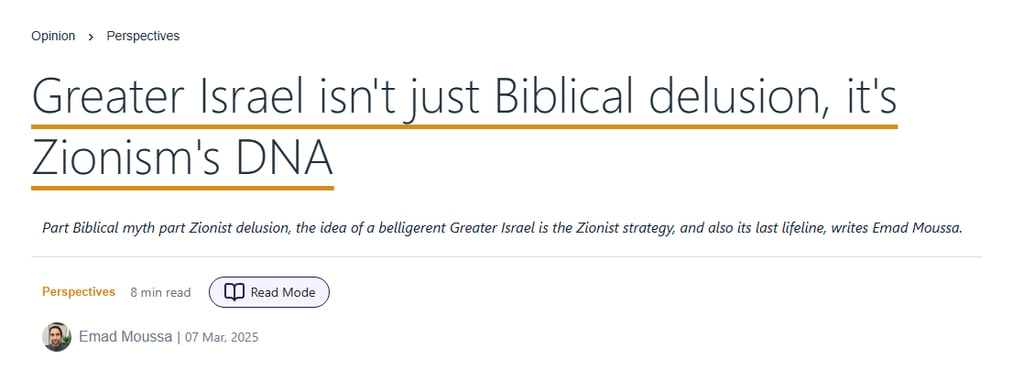

Greater Israel isn't just Biblical delusion, it's Zionism's DNA
Part Biblical myth part Zionist delusion, the idea of a belligerent Greater Israel is the Zionist strategy, and also its last lifeline, writes Emad Moussa.
Donald Trump’s proposal to empty Gaza of its people is an unprecedented disdain of basic morality and international norms.
But for Benjamin Netanyahu — who is the likely initiator of the plan alongside Trump’s son-in-law Jared Kushner — the controversial scope of the plan is irrelevant as long as it lays out a path toward Gaza’s ethnic cleansing.
Circling the idea of ethnic cleansing — if unrealisable at the moment — would make discussing it permissible. That would lead to normalising it as implementable in the future.
Israeli rightists see the post-October 7 2023 atmosphere and the concomitant regional rollercoaster as a historical moment to turn the Zionist expansionist vision into reality.
Judaising Gaza and the West Bank — while crucial to fulfilling the Zionist dream — are a stepping stone toward the so-called ‘Greater Israel’, which extends well beyond Israel’s ‘1948 borders’.
The military incursions into neighbouring countries, especially since October 7, coupled with Israel’s long-standing unfixed official borders, are seen as proof of Tel Aviv’s expansionist intentions.
As Israel invaded Lebanon in September 2024, the Jerusalem Post published — and quickly deleted — an article questioning whether Lebanon and parts of other Middle Eastern countries are part of ‘the promised land’ by God to the children of Israel.
The Israeli army today remains in South Lebanese locations, in clear violation of the US-brokered ceasefire agreement with Hezbollah in late November 2024.
Lebanon is part of a territory that Israel would gradually extend control over, according to Finance Minister Bezalel Smotrich in a documentary titled In Israel: Ministers of Chaos. That is in addition to the Palestinian territories, Jordan, Egypt, Syria, Iraq, and Saudi Arabia.
Before October 7, in May 2023, Smotrich angered Jordan after he gave a speech in Paris at a podium featuring a map that included Jordan, the West Bank and Gaza as part of Israel. He also called Palestinians ‘an invention’.
The myth of Israel
As soon as Syria’s Assad was toppled in December 2024, Israeli tanks rolled into Syria, after Israeli jets waged unprovoked at least 500 strikes on Syria’s army infrastructure.
The Israeli army has since established a buffer zone and nine military bases extending from Mount Hermon in the Golan Heights to the border triangle in Southern Syria — on top of gradually normalising incursions into Syrian territories.
Initially declared as a temporary security measure, the substantiation of military presence in Syria suggests that Tel Aviv is planning to remain there long-term or indefinitely.
For Israel, the difference between long-term and indefinite is only determined by sustainability.
The Israeli military moves (and Israeli officials’ zealous expansionist statements) point to multiple versions of what indeed constitutes ‘Greater Israel’. Varied as they may, these versions are unified in their colonialist eventuality.
In his complete diary, posthumously published in 1960, Theodore Herzl said that the area of the Jewish State stretches “from the Brook of Egypt to the Euphrates”. He thought of it as the region of “Palestine of Solomon and David”.
To the same effect, Rabbi Fishmann, a member of the Jewish Agency for Palestine, declared in his testimony to the UN Special Committee Enquiry in July 1947 — two months before the UN Palestine Partition Plan — that “the Promised Land [Palestine] extends from the River of Egypt up the Euphrates.”
If Herzl and Fishmann’s Greater Israel is realised today, it would swallow significant territories from Egypt, Syria, Iraq, Saudi Arabia, Kuwait, and all of Jordan, Lebanon, and historical Palestine.
This ‘larger than Jewish history’ Jewish state was dismissed by some scholars as a fantasy or played down as a fluid interpretation of the Scripture.
According to Adam Berkowitz of Israel’s Israel365 News, “the precise border of Israel as described in the Bible is a complicated study and the actual borders have changed drastically over the 5000-year history of the Jewish people of the land.”
Pro-Israel American academic Daniel Pipes also argued that the Nile, as per Herzl’s vision of Greater Israel, refers to Wadi al-Arish, on the north coast of the Sinai.
This, however, did not stop Israeli soldiers from wearing the Nile-to-the-Euphrates map on their military uniform during the Gaza operations.
A less outlandish version of Greater Israel was envisioned by Rabbi J. Isaac in 1917 in his book The True Boundaries of the Jewish State that he submitted to the post-World War I Peace Conference. Isaac’s Jewish State stretched from Turkey’s Taurus Mountains to the Egyptian Sinai.
This means taking over all of Lebanon, Western Syria, and parts of Southern Turkey, imposing Jewish dominance on the entirety of the Eastern Mediterranean coasts.
The World Zionist Organisation submitted to the same conference in Paris in 1919 a plan to establish a Jewish State in all of Palestine; South Lebanon up to Sidon; Western Jordan, including the Gulf of Aqaba; and South Eastern Syria.
Another visualisation of Greater Israel included all of Mandate Palestine and Jordan. Menachem Begin — head of the Irgun terrorist group and, later, Israel’s prime minister — said in 1952 that Israel's borders geography would be “both sides of the Jordan…”
It is a similar version of Greater Israel that Smotrich advocated in Paris.
That said, Biblical or historical fantasies are hardly meaningful unless they serve geostrategic goals for modern-day Israel.
By design, the Zionist project for the Middle East may also be seen as part of the US foreign policy aiming to extend US hegemony in the region by fracturing and the ‘Balkanisation’ of the Middle East. In that scheme, Israel plays a crucial, if not the crucial role.
In 1982, Oded Yinon, a journalist and former employee of the Israeli foreign service, wrote an article that would later become “The Yinon Plan”, which set a strategy to ensure Israel’s survival by manufacturing regional fragmentation.
A regional bully
Israel, argues Yinon, must act like an imperial regional power, with military and economic superiority. And for that to work effectively, regional Arab states must disintegrate into smaller, weaker entities.
The sectarian-based states would help Israel create satellite allies from minorities — Druze, Alawites, and Kurds — who would act as a source of moral legitimacy for the Jewish state.
The Yinon plan came on top of earlier Israeli discussions to heighten sectarian divisions in the region for Israel’s benefit.
As early as 1954, Ben Gurion sought to encourage a Maronite Christian separatist state in Lebanon. A partitioned Lebanon would establish a Christian state isolated from Arab extension and able to make peace with Israel, and potentially act as a strategic depth, if not a geographical extension for the Jewish state.
The plan was put in operation during the Lebanon 1982 invasion. Israeli leaders wanted to restructure the Middle East by creating a social/political order in Lebanon favouring Israel’s goals. The Maronite community under then Bashir Gemayel, who would become Lebanon’s new president, was the linchpin of Israel’s strategy.
A similar strategy has now been implemented in Syria. Reports have surfaced that Tel Aviv is considering establishing a corridor that would begin in the occupied Golan Heights and extend through Syria to the East of Euphrates where the Kurds control the area.
The so-called ‘David Corridor’ would go in the south of Syria, parallel to the Jordanian borders, allowing Israel to control a buffer zone between Southern Syria and Jordan, and possibly prepare the area for annexation in the future. What is more, and seemingly working toward that goal, Netanyahu called for ‘demilitarising’ southern Syria and preventing the presence of the new Syrian government’s armed forces in the region.
The idea of employing Syrians in the ‘buffer zone’ to work in the Israel-occupied Golan Heights is being floated by the Israeli government. It is, in a way, a method to pacify resistance and build loyalty, especially amongst the region’s minorities, like the Druze. Such model was implemented, to a degree of success in the Golan Heights after 1967, but failed in Gaza. The final outcome would be separating communities and acquiring land into Israel.
Nearly 30 years ago, Daniel Pipes argued in a paper titled “Imperial Israel: The Nile-to-Euphrates Calumny” that the notion of ‘Greater Israel’ was an Arab propaganda to undermine Israel’s legitimacy.
His claims came at the height of the Oslo peace agreements between Israel and the PLO and in the run-up to the Jordan-Israel Wadi Araba peace treaty in October 1994. The overall scene then was Israeli withdrawals from the Palestinian Territories for the first time, not expansions as per the ‘Greater Israel’ claims.
However, the trajectory since suggests it was simply a de facto pause on the Zionist dream.
Israel after Oslo continued to usurp Palestinian land and build settlements, annexed the Golan Heights, and now set out on a mission to ethnically cleanse Gaza and conquer new areas in neighbouring countries, riding on ‘the convenient regional atmosphere.’
Greater Israel, in other words, has different versions and some of its aspects may well be fantastically built on Biblical and somewhat deranged ambitions. But the expansionist Zionist flavour remains alive and kicking. It is deployed opportunistically and for timely geo-strategic goals.
Dr. Emad Moussa is a Palestinian-British researcher and writer specialising in the political psychology of intergroup and conflict dynamics, focusing on MENA with a special interest in Israel/Palestine. He has a background in human rights and journalism, and is currently a frequent contributor to multiple academic and media outlets, in addition to being a consultant for a US-based think tank.
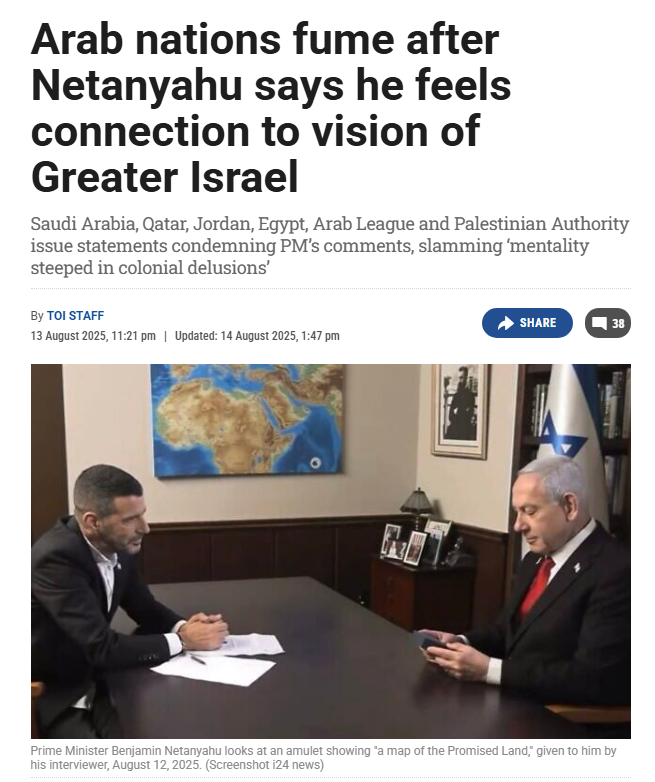

Several Arab countries expressed dismay on Wednesday after Prime Minister Benjamin Netanyahu said a day earlier that he felt a connection to the vision of the “Promised Land” and “Greater Israel.”
In an interview with i24News aired on Tuesday evening, Netanyahu was asked by network anchor Sharon Gal if he “feels a connection” to a “vision” of the biblical Promised Land, as depicted in an amulet that Gal had just given him. Netanyahu responded: “Very much.”
Gal stressed to him, “It is Greater Israel.” Netanyahu responded, “If you ask me, we are here,” paused, and then turned the subject to the role of his father’s generation in establishing Israel and his own generation’s responsibility to ensure Israel’s survival.
The term Greater Israel refers to Israel in expanded borders in accordance with biblical or historical descriptions, and has many versions, some of which include parts of today’s Jordan, Lebanon, Syria, Egypt, Iraq and Saudi Arabia. It was popularized after the Six Day War of June 1967 to also refer to Israel and the areas it had just conquered — East Jerusalem, the West Bank, the Gaza Strip, the Sinai Peninsula and the Golan Heights.
It is still adopted by some far-right figures in Israel who express a desire to annex or eventually control many of those territories.
Gal, who was briefly a right-wing member of Knesset, asked the question after handing Netanyahu what he said was an amulet of “a map of the Promised Land,” which is not seen on screen.
The news anchor has recently begun selling pendants that appear to feature a map of a relatively maximalist “Greater Israel.”
Saudi Arabia, Qatar, Jordan and the Arab League all issued statements censuring Netanyahu’s comment and warning that they threaten regional and global stability.
A spokesman for Israel’s Foreign Ministry did not respond to a request for comment.
Jordan’s foreign ministry said in a statement that it condemns Netanyahu’s remarks, referring to them as a “dangerous and provocative escalation.”
The statement quoted Sufyan Qudah, a ministry spokesman, issuing an “absolute rejection of these inflammatory statements.” He added that such “claims and illusions, adopted and promoted by extremists in the Israeli government, encourage the continuation of cycles of violence and conflict.”
The border fence at the tripoint border between Israel, Syria, and Jordan, northern Israel, on February 15, 2024.
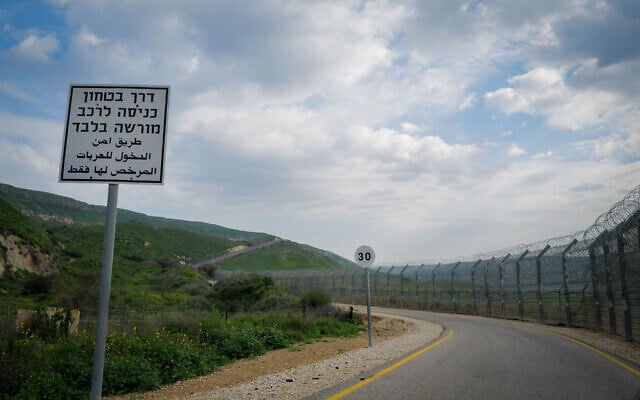

Egypt’s Foreign Ministry also condemned the remark, saying Cairo had asked Israel for clarification given the “implications of provoking instability and reflecting a rejection of the pursuit of peace in the region, as well as an insistence on escalation.”
“This contradicts the aspirations of regional and international parties that are peace-loving and seek to achieve security and stability for all the peoples of the region,” it added.
In its own statement, Qatar’s foreign ministry expressed “its condemnation and denunciation” of Netanyahu’s comments, “considering them an extension of the occupation’s approach based on arrogance, fueling crises and conflicts.”
Doha added that the “false Israeli allegations and absurd inflammatory statements will not undermine the legitimate rights of Arab nations and peoples,” and reiterated Qatar’s “full support for all efforts aimed at achieving a just, comprehensive and sustainable peace in the region.”
Saudi Arabia’s foreign ministry issued a strong condemnation of the comments, as well as a “complete rejection of the settlement and expansionist ideas and projects adopted by the Israeli occupation authorities.” It also issued a warning “to the international community against the Israeli occupation’s continued blatant violations, which… threaten security and peace at both the regional and global levels.”
The Arab League’s statement on Netanyahu’s comments called them a “blatant violation of the sovereignty of Arab states and an attempt to undermine security and stability in the region.”
The remarks, it added, “reflect expansionist and aggressive intentions that cannot be accepted or tolerated” and also “expose a mentality steeped in colonial delusions.”
From left to right, Egyptian Foreign Minister Badr Abdelatty, Saudi Foreign Minister Prince Faisal bin Farhan, Jordanian Foreign Minister Ayman Safadi, Bahraini Foreign Minister Abdullatif bin Rashid Al Zayani, and Arab League Secretary-General Ahmed Aboul Gheit, holds a press conference following the ministerial committee of the Arab-Islamic Extraordinary Joint Summit on Gaza, in Amman, Jordan, June 1, 2025. (AP/Raad Adayleh)
The Palestinian Authority joined in the condemnations, describing them as “a provocation and a dangerous escalation that threatens the security and stability of the region, stemming from the occupation state’s expansionist colonial policies.”
Ramallah stressed that it is “committed to what has been approved by international legitimacy and international law on the establishment of the independent State of Palestine on the borders of 1967, with East Jerusalem as its capital.”
The idea of Israel annexing portions of neighboring Arab countries as part of the “Greater Israel” vision is not widely accepted among mainstream Israelis, but the inclusion of some extremist ministers in Netanyahu’s coalition has provided the concept with more prominence.
Finance Minister Bezalel Smotrich speaks in Paris on March 19, 2023. (Ynet screenshot; used in accordance with Clause 27a of the Copyright Law)
Far-right Finance Minister Bezalel Smotrich drew ire in March 2023 when he gave a speech in Paris from a podium that featured a map of “Greater Israel” — leading Jordan to summon its Israeli envoy in protest.
In response to the anger, the Foreign Ministry at the time reiterated that Israel is “committed to the 1994 peace agreement with Jordan. There has been no change in the position of the State of Israel, which recognizes the territorial integrity of the Hashemite Kingdom.”
Political news, commentary for the enraged reader
contact@dailybeastie.com
© 2025 DailyBeastie.Com - All rights reserved.

